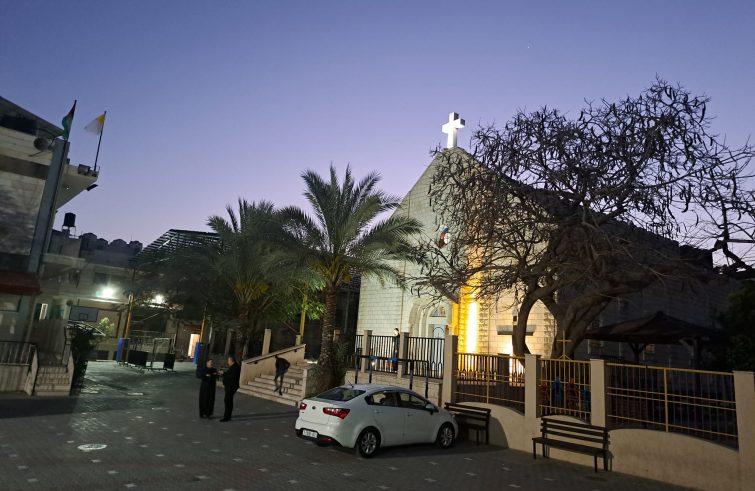
“In Gaza – say the displaced Christians of the Latin Parish of the Holy Family – dawn breaks earlier than anywhere else. Darkness never falls: the glare of the rockets, the noise and flash of the bombs and bullets, the fires of the explosions that light up every minute of the night, frighten us and don’t give us a moment’s rest.”
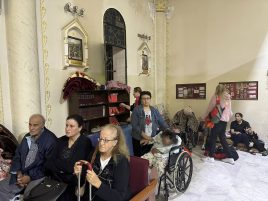 Nevertheless, each morning, mattresses, pillows and blankets are neatly arranged along the walls of the small church, which features a large painting of the Holy Family in the apse. More than 700 displaced Christians are sheltering in the parish compound, and daily life is not easy. Since 7 October, when “this terrible war broke out”, Sister Nabila Saleh told SIR, “almost all the Christians in Gaza, about 1,000 people, have suffered damage or destruction to their homes and today the only place where they can live with some dignity is the church compound.”
Nevertheless, each morning, mattresses, pillows and blankets are neatly arranged along the walls of the small church, which features a large painting of the Holy Family in the apse. More than 700 displaced Christians are sheltering in the parish compound, and daily life is not easy. Since 7 October, when “this terrible war broke out”, Sister Nabila Saleh told SIR, “almost all the Christians in Gaza, about 1,000 people, have suffered damage or destruction to their homes and today the only place where they can live with some dignity is the church compound.”
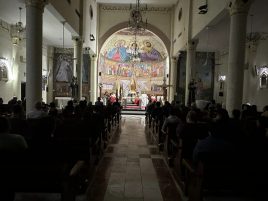 Many parishioners have chosen to sleep inside the church because, as a nun from the Congregation of the Sisters of the Rosary of Jerusalem explained, “they are afraid to spend the night in the parish buildings, which are next to the streets and therefore exposed to the bombs.
Many parishioners have chosen to sleep inside the church because, as a nun from the Congregation of the Sisters of the Rosary of Jerusalem explained, “they are afraid to spend the night in the parish buildings, which are next to the streets and therefore exposed to the bombs.
If we are going to die, we prefer to die as close as possible to Jesus, close to the altar. We will not leave this place, this is our home and we will not leave it.”
The transition from mattress to church pew has become almost a game for the many children who crowd the parish. Many stay in their pajamas to attend Mass, then grab some breakfast and run off to play in the courtyard, if the security situation allows, or in an indoor hall. “We try to liven up their day,” says Mother Maria del Pilar, a missionary of the Institute of the Incarnate Word (IVE) in Gaza, “to give them a glimpse of normality and maybe bring a smile to their faces.
In his daily phone calls, Pope Francis always tells us to ‘look after and protect the little ones.’”
The story of Eli. Children like Eli. His story is the story of many children in the Strip, says Sister Nabila: “Eli was with his family in the Orthodox cultural centre, which was shelled by Israel. He was rescued from the rubble and now lives here in the church compound with his parents and siblings. Whenever he hears the planes and bombs, he puts his hands to his head and shouts:
“We are going to die! We are going to die!.”
Then he runs into the church and starts praying the rosary to calm himself.
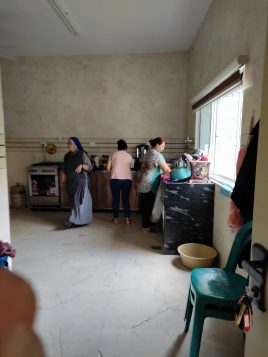 Innocent deaths. The days go by slowly, while the news of what is happening outside keeps coming in, making the future even more frightening. Women and men work hard to prepare meals, to keep the communal areas clean and tidy, to keep the solidarity machine running efficiently, leaving no one behind. Water, food and fuel are carefully rationed. Buying them means spending a lot of money. “Some products can only be found on the black market at three times the price. But Divine Providence has never abandoned us,” says Sister Nabila. Those who can, try to help Mother Teresa’s Sisters of Charity, who are caring for dozens of disabled children and bedridden elderly. When there is electricity, people charge their smart phones. But what is often lacking, we are told in the parish, is “access to the Internet.” The Israeli army cuts off communication. Talking to friends and family is impossible. Especially now that half the population has been forced by Israel to evacuate to the south, where clashes continue, it is important to know how they are and where they are in order to keep in touch. Just a few days ago, Sister Nabila recalls, the Israeli army distributed leaflets in several villages in the Khan Younis area, where thousands of people who had fled from the north had taken refuge, asking them to evacuate again. First they were forced to leave their homes in the north to go south, now they have to leave the south. But where will they go?
Innocent deaths. The days go by slowly, while the news of what is happening outside keeps coming in, making the future even more frightening. Women and men work hard to prepare meals, to keep the communal areas clean and tidy, to keep the solidarity machine running efficiently, leaving no one behind. Water, food and fuel are carefully rationed. Buying them means spending a lot of money. “Some products can only be found on the black market at three times the price. But Divine Providence has never abandoned us,” says Sister Nabila. Those who can, try to help Mother Teresa’s Sisters of Charity, who are caring for dozens of disabled children and bedridden elderly. When there is electricity, people charge their smart phones. But what is often lacking, we are told in the parish, is “access to the Internet.” The Israeli army cuts off communication. Talking to friends and family is impossible. Especially now that half the population has been forced by Israel to evacuate to the south, where clashes continue, it is important to know how they are and where they are in order to keep in touch. Just a few days ago, Sister Nabila recalls, the Israeli army distributed leaflets in several villages in the Khan Younis area, where thousands of people who had fled from the north had taken refuge, asking them to evacuate again. First they were forced to leave their homes in the north to go south, now they have to leave the south. But where will they go?
No place is safe in Gaza. This is not humane. I wonder where all the governments are, especially the European ones, who claim to be defenders of human rights.
Nobody is saying a word, nobody is talking about this injustice! And innocent people are dying. We lack everything: food, water, medicines. The shops that are still open are running out of stock. How much longer can we hold out? We are exhausted.
In Gaza, people are dying every day from fear and from weapons.
The home for the disabled of Mother Teresa’s nuns in Gaza (SIR archive photo)
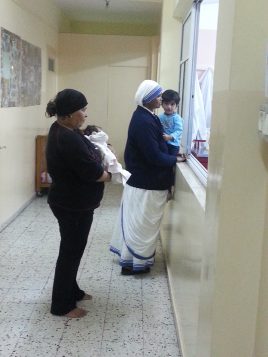 Caught between two fires. Meanwhile, according to George Anton, administrative director of Caritas Jerusalem in Gaza, “virtually no one goes out of the compound because it’s extremely dangerous. We only go out for urgent needs, such as special medical visits or in search of food, medicine and water that we really need.” His words again:
Caught between two fires. Meanwhile, according to George Anton, administrative director of Caritas Jerusalem in Gaza, “virtually no one goes out of the compound because it’s extremely dangerous. We only go out for urgent needs, such as special medical visits or in search of food, medicine and water that we really need.” His words again:
“We have remained, we have not left and we don’t intend to leave, despite the fact that we lack everything, despite the terrible, sleepless nights, despite the terrible days we are enduring. Even at the cost of our own lives.”
An elderly Christian woman, Elham Farah, was killed a few days ago, shortly after leaving the community: “She was an 84-year-old retired music teacher,” local sources told SIR, quoting the woman’s relatives. “She was shot in the legs by snipers and ended up being run over by an Israeli tank. It was impossible to recover her body for several days. It was finally taken to al-Shifa hospital and buried with other bodies. We could not bring her back to the parish to give her a proper burial. Her only crime was to return to her destroyed home to retrieve some of her precious possessions. All the streets of Gaza are full of corpses.”
“The situation is getting worse by the hour,” adds Sister Nabila, “Israeli tanks are in our neighbourhood, stationed in front of the al-Ahli Baptist Hospital. Yesterday afternoon a house was bombed, right opposite the parish church. Three people were wounded. We are caught between two fires. No one knows what might happen from one moment to the next.”
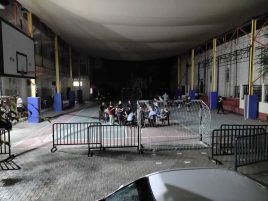 A date with hope. The main entrance to the parish is almost always closed, while that to the church is “always open” for people to stream in when they hear the bombs Life in the parish is marked by prayer. Mass is celebrated twice a day, in the morning and in the evening, and the rosary is prayed in the afternoon. The prayer intention is one and only: “For the war to stop.”
A date with hope. The main entrance to the parish is almost always closed, while that to the church is “always open” for people to stream in when they hear the bombs Life in the parish is marked by prayer. Mass is celebrated twice a day, in the morning and in the evening, and the rosary is prayed in the afternoon. The prayer intention is one and only: “For the war to stop.”
“The only weapon we have to defend ourselves is prayer. Prayer gives us the light to look forward with confidence.
– explains Sister Nabila. In the midst of the rubble of this war, which is very different from previous wars, faith helps us to resist. There have never been so many deaths, never so much destruction. Half of Gaza has been wiped out. Thousands of innocent people have lost their lives. And it’s not over yet. This is not justice. The people of Gaza are not asking for war, they are asking for peace. Only Pope Francis hears our cry. He calls us every day, and for all of us in the parish, this call is a date with hope.”











